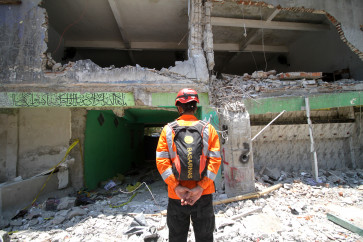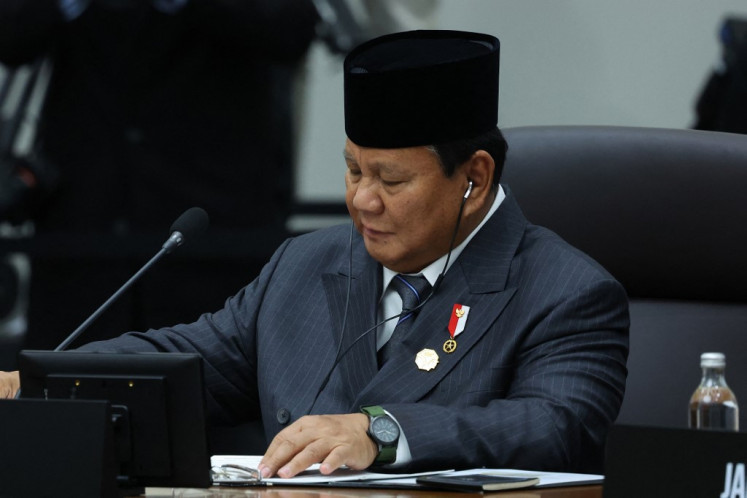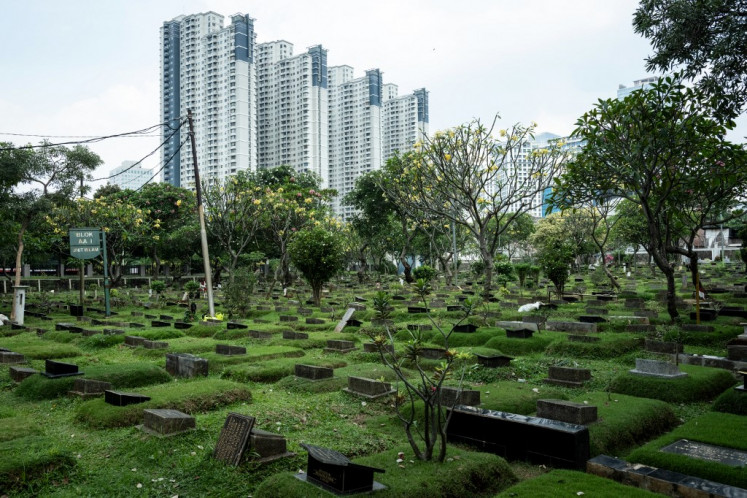Popular Reads
Top Results
Can't find what you're looking for?
View all search resultsPopular Reads
Top Results
Can't find what you're looking for?
View all search resultsAhmadiyah can worship, Kalla says
Jamaah Ahmadiyah can continue in Indonesia and its followers are allowed to worship in their homes and mosques, but they must not preach or try to convert others, Vice President Jusuf Kalla said Tuesday
Change text size
Gift Premium Articles
to Anyone
Jamaah Ahmadiyah can continue in Indonesia and its followers are allowed to worship in their homes and mosques, but they must not preach or try to convert others, Vice President Jusuf Kalla said Tuesday.
LET THIS BE OUR PRAYER: Members of Jamaah Ahmadiyah pray Tuesday in Yogyakarta. Under a joint ministerial decree issued Monday, sect members must stop their religious activities or face prosecution. (JP/Slamet Susanto)
"No, they (the government) have no plan to ban Ahmadiyah" provided it follows the law, the Vice President told Reuters in an interview, clarifying a joint ministerial decree issued Monday against the minority Islamic sect.
The decree stops short of explicitly banning or dissolving Ahmadiyah, whose followers believe the sect's founder, Mirza Ghulam Ahmad, not Prophet Muhammad, is Islam's last prophet.
Nor does the document clearly state whether sect members are allowed to worship in private.
The decree orders the sect to stop all religious activities or face five years in jail for blaspheming Islam.
It forbids Ahmadiyah from "spreading interpretations and activities that deviate from the principal teachings of Islam".
State Secretary Hatta Radjasa denied that the decree, signed by Religious Affairs Minister Maftuh Basyuni, Home Minister Mardiyanto and Attorney General Hendarman Supandji, contravened the Constitution and its guarantee of freedom of religion.
President Susilo Bambang Yudhoyono did not intervene in drafting the decree, fully entrusting the matter to the three Cabinet members, Hatta said.
The decree was issued as the government faced intense pressure from extremist and some mainstream Muslim groups to ban Ahmadiyah.
Kalla said the decree, which has been slammed as "unconstitutional" by human rights groups and moderate Muslims, simply reiterated what is permitted under the Constitution.
Among the critics of the decree is Harkristuti Harkrisnowo, a prominent criminologist and current director general for human rights at the Justice and Human Rights Ministry.
She said the issuance of the document may have been the result of intense pressure from hard-line groups.
"Who has the authority to determine what is Islam and what is Christian or Hindu? Does performing religious duties in a different way exclude me from a religion?" Harkristuti asked.
She encouraged Ahmadiyah followers to file a petition with the Supreme Court seeking a review of the decree.
They can also file a petition with the Constitutional Court for a judicial review of the 1965 law on blasphemy, which the government used as the legal basis to issue the decree, she said.
Harkristuti said the government needed to protect the sect.
"We should refrain from making its followers objects of persecution."
She also regretted that internal conflicts within Islam often resulted in violence.
"Other religions have different factions, schools and sects, but we have never heard of violent conflicts between them," she said.
Effendy Choiry, who chairs the National Awakening Party (PKB) faction in the House of Representatives, also criticized the Ahmadiyah decree.
"Our legal system does not recognize such a thing as a joint ministerial decree. So the question is whether this decree is legally binding or not? I think it has no legal power at all," he said.
He called on Ahmadiyah to defy the decree and continue to practice their faith as before.
"This is a matter of faith. The government or the state cannot meddle in it because this is a private matter. Our Constitution guarantees freedom of religion.
"This does not mean that I agree with Ahmadiyah's beliefs, but in this case, the government cannot side with one group to attack another group," Effendy said. (drew/alf)










